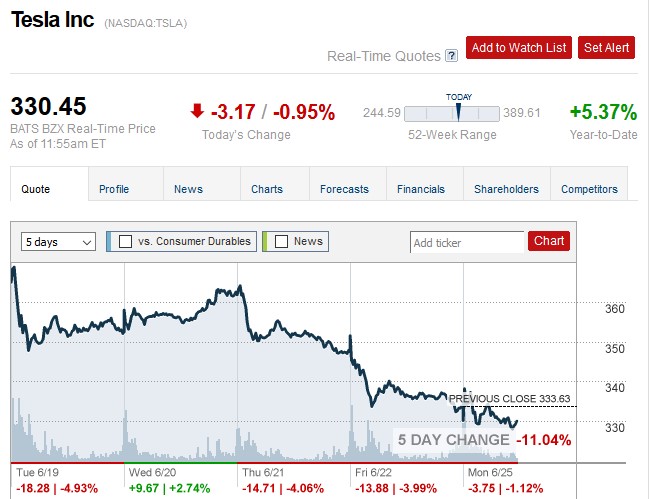Tesla is a highly unusual company. From the kind of cars it makes to how it makes them and where it makes them, the EV maker has made defiance of convention a point of pride.
Tesla’s latest idiosyncrasy of building its Model 3 sedans in a huge tent has been dominating headlines. While its penchant to make on-the-fly fixes to automated equipment might help the company to meet its goal to churn out 5,000 Model 3s a week by the end of June, what is less clear is how it will manage to eke a profit from its modest $35,000 price point.
Musk has set an ambitious goal for the company to become profitable in the current year.

(Click to enlarge)
Source: CNN Money
The company though has a few kitchen sink items that it can use to score a quarterly profit.
Since 2015, Tesla has been selling tax credits it receives from the state of Nevada to casinos and using the cash to pad its bottom line. Nevada lured Tesla’s giant lithium-ion battery plant to a site just outside Reno in exchange for $1.3 billion in incentives, mostly in the form of tax exemptions for a period of 10-20 years.
The state also gave the company $195 million in transferable tax credits that it cannot use directly unless it sells them.
So far, Tesla has sold $131 million in tax credits to casinos and has booked a total of $163 million in anticipation of more sales. Casinos use the tax credits, usually purchased at a discount of 85 to 95 cents on the dollar, to lower the gambling taxes they pay to the state. Related: Chip Stocks Down But Are They Still A Good Buy?
Tesla receives the tax credits from the state as it hits several milestones including spending a minimum of $3.5 billion and hiring thousands of Nevada residents, something it has already achieved.
The company has been selling the credits at an ever-increasing rate, blowing a big hole in Nevada’s budget surplus. Budget officials had expected a $61.1 million surplus for the current fiscal year, but later lowered it to only $18.4 million thanks to Tesla selling tax credits at a faster than expected clip.
Moving the Needle
But don’t expect to find those details in Tesla’s 10-Ks because the company is quite coy about the credits. Tesla has never revealed how much of the credits it applies in any given quarter, only using general terms to report credit cash flow whenever it’s posted.
And the company certainly needs the cash.
Tesla has only managed to turn a profit in two quarters in its 15-year lifetime, one for $15 million and another $22 million during the first and third quarters of 2016, respectively. The company racked up heavy losses of $2.2 billion on sales of $11.8 billion in 2017. Tesla still has $32 million in tax credits unsold and unbooked, which in theory could move the needle for the company by flipping a quarterly loss into a profitable one.
In reality, however, Tesla can only become consistently profitable by ramping up its Model 3 production clip to around 10,000 vehicles a week so as to enjoy considerable economies of scale. But given the severe challenges the company has been facing just to get to 5,000 per week, that probably won’t happen in another 2-3 years.
By Alex Kimani for Safehaven.com
More Top Reads From Safehaven.com:
















